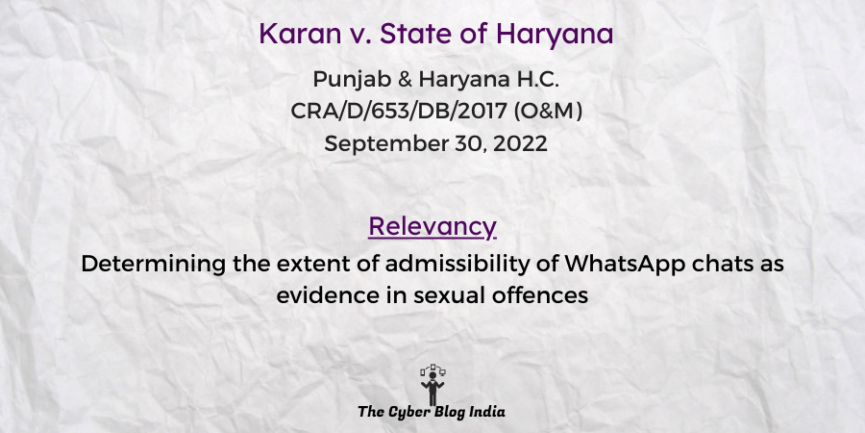Karan v. State of Haryana

Karan v. State of Haryana
In the High Court of Punjab & Haryana
CRA/D/653/DB/2017 (O&M)
Before Justice Tejinder Singh Dhindsa and Justice Pankaj Jain
Decided on September 30, 2022
Relevancy of the Case: Determining the extent of admissibility of WhatsApp chats as evidence in sexual offences
Statutes and Provisions Involved
- The appellant is one of the accused persons in a case involving allegations of gang rape. Another accused also forced and blackmailed the victim to send her intimate pictures and threatened to publish her videos online.
- The appellant and other accused persons have filed respective appeals against the trial court’s judgment by claiming that the victim’s consent was present.
Prominent Arguments by the Advocates
- The appellant’s counsel argued that there has been no repeated gang rape or rape. Even if the events mentioned by the complainant are true, they have occurred only twice a year. She has intentionally withheld evidence. This is evident from the fact that she was using two mobile phones, and only one of them was presented as evidence. Further, the investigation agency did not make any efforts to check the accused persons’ phones to ensure conformity.
- The prosecutor contended that a trial court can rely on the victim’s sole testimony, which is an established rule. Furthermore, the WhatsApp chats clearly show that she had no choice but to submit to the accused persons’ demands. Submission is not equivalent to consent.
Opinion of the Bench
- Per State of Maharashtra v. C.K. Jain (1990) 1 SCC 550, a court must observe the prosecutrix’s evidence in sex offences, which sets the basis for conviction based on her testimony. The court can also accept evidence if it is endorsed in significant particulars.
- There are allegations against all three accused persons. WhatsApp messages are an electronic record, per the provisions of the Information Technology Act, 2000. With a Section 65B certificate, a court can take them on record as evidence.
Final Decision
- The court upheld the trial court’s impugned judgment for the appellant.
Saatvika Reddy Sathi, an undergraduate student at Jindal Global Law School, Sonipat, Shravya Srivastava, an undergraduate student at the University of Lucknow, and Upama Nandy, an undergraduate student at Symbiosis Law School, Pune, prepared this case summary during their internship with The Cyber Blog India in January/February 2023.
